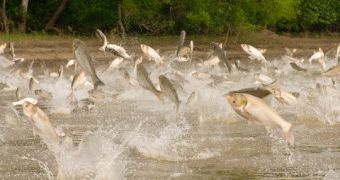A team of researchers from Canada and the United States recently analyzed the interactions between Asian carps (i.e. species of fish that typically grow in Chinese ecosystems) and the US's Great Lakes ecosystems.
Focusing on the bighead and the silver carps, the scientists reached the conclusion that these fish pose great risk to indigenous species, and that unless something is soon done to control their population boom, said fish might soon take over the natural habitats in this region.
This particular research also makes a case of how food resources in the Great Lakes ecosystems more than allow for these foreign species to breed.
Scientists explain that this is alarming news indeed, especially given the fact that native species which are important both for commercial and for recreational fishing are quite likely to soon become extinct.
This in turn is argued to possibly foster considerable financial difficulties for the communities living nearby US's Great Lakes.
As quoted on the US Geological Survey's website, the agency's director, Maria McNutt, made the following commentaries on this issue: “Ever since these non-native fish first escaped and began to breed prolifically in the rivers of the Midwest, the questions everyone has been asking are: 'Can a breeding population survive in the Great Laked and would it be a significant problem it they did?'”
She goes on to explain that “Now we know the answers and unfortunately they are 'yes and yes'”.
In order to safeguard fish species native to this part of the world, efforts are now made to block the Asian carps from further entering the Great Lakes.
Thus, electric barriers are to be erected between the Chicago Area Waterways System and Lake Michigan, since apparently this is the carps' favorite traveling route.
Moreover, the Asian Carp Regional Coordinating Committee is presently tracking down and monitoring the carps that already made their way into US's Great Lakes.
From where we stand, this situation only goes to show that natural ecosystems have a well-established balance one should not interfere with by relocating species to areas where they do not belong.

 14 DAY TRIAL //
14 DAY TRIAL //